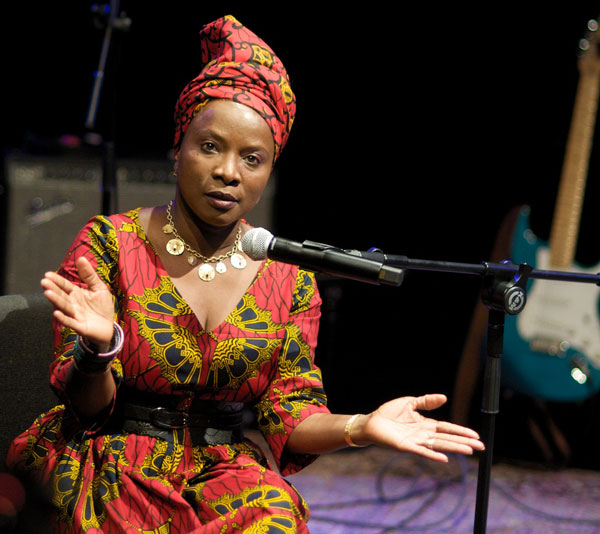2014 is looking like a big year for Benin’s biggest music star, Angélique Kidjo. She has a new book out, “Spirit Rising: My Life, My Music” (with Rachel Wenrick. Harper Design). It tells the story of her remarkable artistic childhood in Cotonou, Benin—she was blessed with forward-looking and deeply supportive parents—her escape from a dictatorial communist government that suppressed artistic freedom, and her rise as an international star, culminating in her selling out Carnegie Hall in 2010. Angélique also has an ambitious new CD, “Eve” (429 Records), dedicated to the women of Africa. The album incorporates recordings of women’s choirs Angelique recorded, mostly in Benin, including her own mother, Yvonne, after whom the album is named. Afropop’s Banning Eyre sat down with Angelique in her Brooklyn home recently to talk, in particular, about the new music. Here’s their conversation.
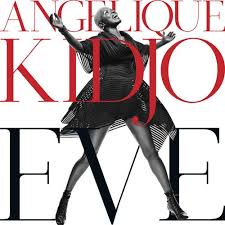
Photos by Banning Eyre. Live shots are from the 2013 Nuits d’Afrique Festival in Montreal, and from Angélique’s appearance at the Red Hot and Fela performance in August, 2013, at Lincoln Center Outdoors. The shots of her seated and speaking, and playing duo with guitarist Dominic James, come from the Brooklyn Academy of Music (BAM)’s Unbound literary series, where Angélique discussed her new book with Terrance McKnight on January 27, 2014.
Banning Eyre: So, Angélique, Eve must be--what--your tenth album? Maybe the eleventh, if we count that early one from France that no one can find. I haven’t kept count.
Angélique Kidjo: I haven’t counted either.
BE: Each album you make has a concept. Last time we met, we were talking about the autobiographical CD you did in 2010, Oyo. What was the idea of this album?
AK: The idea has always started with inspiration. If you’re not inspired, all the rest is just petty cash, right? We wrote a couple of songs and the demo was there. And then last summer, last August, I went on a trip with UNICEF as a goodwill ambassador to Kenya. And we arrived in the Samburu district in the little tiny Maasai village and I was welcomed by the women that were part of the program that we have in the community. I just walked into that song [“M’Baamba”], like the sun shining more than ever-- that kind of feeling when you are drawn into a bright light and right there you are taken by it. I don’t understand a thing and I jump in singing with them. And that’s where the concept started.
BE: Why were you in that village in the first place?
AK: Because we were in a place where they have the problem of stunting. Stunting is the acute malnutrition of a baby. And malnutrition is not the fact that you don’t have the food. It is that the food that you are eating is too poor in nutrients to feed correctly the pregnant mother and, therefore, to feed the child’s brain so it can develop properly. Until I heard about it, I did not know the scope and magnitude of this problem in the world—not only in Africa. You have those children whose lives can be turned over from zero to two years old. If we can take care of that nutrition before they hit two years old, we can reverse that. And once the two years passes, you can see 19, 20 years old kids that look like they’re 11. The brain doesn’t develop well, so they can’t work. Suddenly you see good nutrition and the impact it has on the economy of a country. So, those women were in that situation. Yet, here I am. They’re smiling, beautifully dressed, as always. It doesn’t matter how poor the African women are. They’re always elegant. I wanted to celebrate that. And that’s where the whole album started from. For me to start in Kenya, to go to my country to those women-- my mother, my grandmother and all the women in Benin and Africa-- for their mentoring, their examples, their resilience. They taught me to be who I am today.
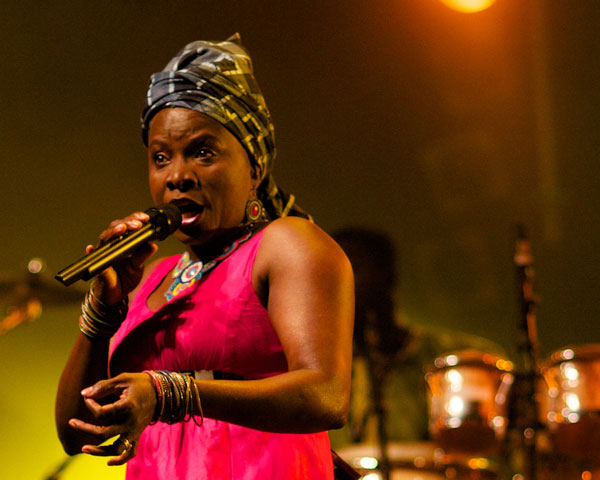
Angelique Kidjo, Nuits d'Afrique, Montreal (Eyre 2014)
BE: That opening song on the album is Kenyan song, “M’Baamba.”
AK: That is the exact same song. When we arrived we didn’t expect that. So how did we get the song? Jean [Hebrail, Angelique’s husband] got his iPhone out and recorded the song and filmed at the same time. So we have the image of them singing. Even if you prepare for something like that, you never know what it’s going to be. Even if it’s been organized. So that moment of truth is something that I captured, and I built the whole album around it.
BE: That’s amazing. That’s great. So from that flowed the idea of going to Benin and recording choruses there?
AK: Yeah. And also, funny enough, most of the songs that I had written before that trip were talking about already different women’s issues.
BE: What were some of the early ones?
AK: All of them, pretty much. All the sketches were there already before I left. I had recorded some in the studio, knowing that I wanted to come back and do more work on them. And then when I went to the women, it fits in. It doesn’t feel like a patchwork because I left room. I knew there would have to be something more than that. I was waiting for the inspiration of that thing that I’m talking about to come. And it hits me in Kenya. The women voices were completely a part of it in my heart, in my head, and all
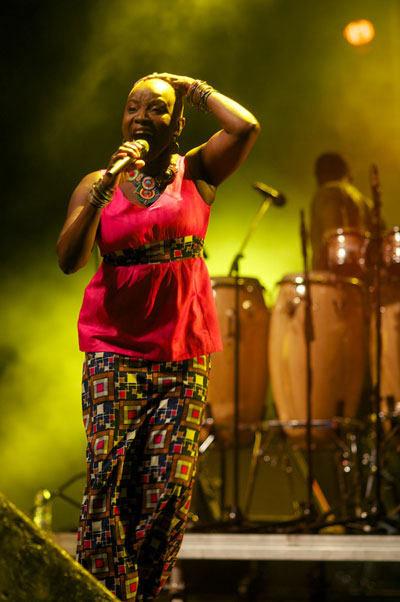
over my body. First of all, I’ve always been a witness to my time, the voice of the ones that have no voices. Many of the issues that we have to deal with in Africa, and we’re talking about African renaissance, we’re talking about how Ghana is growing fast, we’re talking about countries that are doing very well today in Africa, and the next biggest continent in terms of population is going to be Africa, as of 2015.
If we’re talking about the young kids, they can only unleash their potential and be able to dream and see their dream being achieved if we take a holistic approach to how we’re dealing with them. One of the problems that I’ve always been vocal about is early marriage. That’s why I put Batonga [Angelique’s foundation for educating young girls in Africa] together—to provide them secondary education. When you put a girl in secondary education, if she doesn’t drop out or get pregnant, the chance of her getting married early is zero. Early marriage is something that has to stop. Forced marriage also has to stop. Female genital mutilation also has to stop. All those issues have been part of it.
This has been a year that I have campaigned for a resolution to be signed against female genital mutilation, with the concept that I had at the UN General Assembly in February 2012, with the collaboration of the Italian mission at the UN. The Ambassador of Italy was the one that came to me and said, “We need you here because the African ambassadors to the UN are tired of hearing us patronizing them and talking to them. But you are such a figure in Africa. Why don’t you help us do this?” So in December of 2012, the resolution was signed by everybody. Now we have to implement it with action. All that had fed my inspiration when I was making this album. You see those women. Even those women that have been through female genital mutilation. It’s not something that you carry with you. They have that strength and that smile and that joy all the time. But we have to stop that practice.
So women’s issues are really close to my heart. Because as a woman, we cannot ask in America for women to have equal degree, equal pay and not take care of the millions and billions of women all over the world that are not even there yet. How do we bring people’s attention to those topics without victimizing the African women—not patronizing them, but celebrating their resilience and beauty—if it’s not from music?
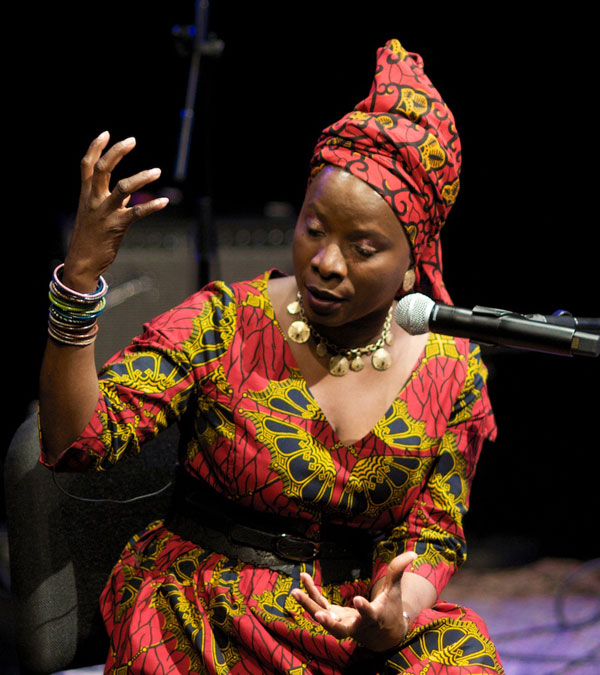
Angelique Kidjo at BAM's "Unbound" event (Eyre 2014)
BE: Well said. On that topic of women, and especially girls, tell us a little about your own foundation.
AK: Yes. The Batonga Foundation is a very small foundation. We are only in five countries. We give scholarships, mentoring, tutoring, teacher training, one meal a day, uniform and books for girls that come from very extreme poor backgrounds. Some are orphans of AIDS or orphans simply, or disabled. And it is a task that is titanic, absolutely difficult because it is a very sensitive age. You are talking about teenagers. You are talking about the responsibility of the school, especially when most of the teachers are men, which brings the father to say, “I don’t want my daughter to go to school because I don’t want her to become pregnant.” It’s not only giving education. When you are working on a secondary education you have to really watch out for the girls.
Right now, I have two girls that have health issues. We’re using the scholarship toward that. One has elephantiasis of the feet. One has cancer. We have the health file and they look at it and say, “It is doable. It is curable.” So we’re going to work on that. It’s beyond education. Everything is connected and, because we are such a small organization, we don’t attract big donors. I don’t want to be too big and not be able to hold people accountable. When you get big money gets smuggled away. I don’t want that. What I try to do is work with organizations in the field that have the means and have crystal clear credentials to associate with me, to carry on my program. In Benin, we work with USAID. In Ethiopia, we work with two different organizations. Ababa, we work with Hope for Children, and in Arba Minch in the southern part of Ethiopia, we work with Mercy Corps. We do micro-loans for the mothers. The contract we signed with them is to keep the girls in school and is linked to the tuition, too. So that is working.
BE: It’s to give them an incentive to stick with it. So it’s all about education
AK: Exactly. It’s all about education. Keep them in school. So what we’re trying to do now is start a conversation with Mercy Corps and do it everywhere where the programs are right now. One of the other places that is really heartbreaking for me is the girls that we have in Kidal in Mali. The project went silent. We have no news. We don’t know what’s going on. We’ve invested three to four years into those girls and we have no news today. It is chaos. I lose my sleep over it. So I just hope they are not raped, they are not killed. I don’t know what to do. If that conflict’s finished, how do we get them back? Even if they cannot go to school anymore, how do we give them vocational training for us not to lose the momentum of what they have learned and for them to have an income-based activity?
BE: How many girls are we talking about in Kidal?
AK: 60.
BE: Wow. Looking at your western and American audience, people know about the problems of women around the world, but also when they think of African women, they have images of very strong, wise, artistic women—people like you and Rokia Traore, and any other number of amazing women artists. What do you think that that outside-of-Africa audience doesn’t know about African women that you want them to know?
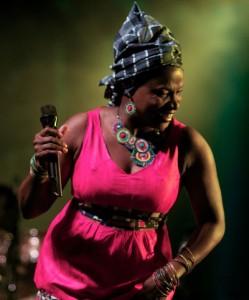
AK: They know their resilience and their beauty. What they don’t know is their capacity for forgiveness and compassion. An African woman would die for somebody that is a child of somebody else. Because every life for them is more important than anything else. They will fight the fight that is not theirs, even if it’s dangerous. That instinct is universal, but is much more developed in Africa because people are poor. The only thing that can be a legacy after them is the children, and they want to do the best for them. I’ve witnessed situations where poverty put a stress on that because the girl is obliged to go to school, to find a job, to help make ends meet for the family. I remember once I was in Benin and a woman said to me, “I can’t even look at you.” I said, “Why?” She said, “I’m ashamed.” I said, “Why are you ashamed?” She said, “I don’t have proof of it, but I know deep in my heart that my girl is going to prostitution to pay for us to feed the kids, her brothers and sisters.”
It took my breath away—for a mother to say that and to be in that position. For any parent. And I think for a very proud African woman, it’s killing her because that’s not the future that she wanted for her child. For me, education is also to eradicate poverty. Because when people are educated they make choices that never bring them back to being the victim of something or somebody. And it’s proven that when you educate women you improve the GDP of the country. So that’s why, among all those fights that we are fighting, education for me is at the core of it. We can’t talk about democracy, economy, even Wall Street—having a place like Wall Street one day in Africa—if we don’t understand what a bank stands for. A lot of women in the market in Africa—they don’t open a bank account. Can you imagine how many billions every day goes through their hands and never goes to the bank? Because they don’t trust the bank. If you are educated, you know that you can trust the bank to a certain extent. Your money can be safe because there are guarantees, there are securities. And the banks have to be crystal clear. For Africa to really be the place for people to go and invest and do business, we need to educate the women of Africa. Without it, there is nothing that’s going to happen.
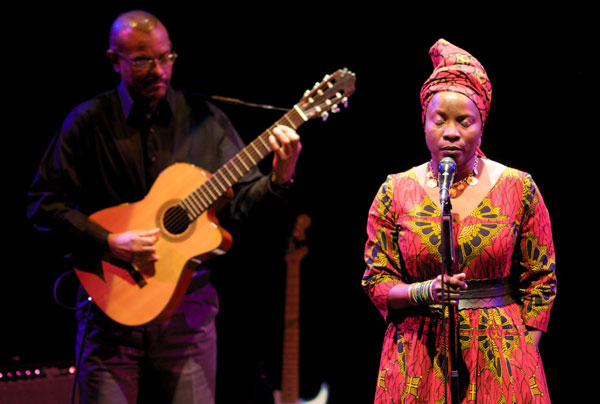
Dominic James and Angelique at BAM (Eyre 2014)
BE: So let’s come to the songs on the album. I’m in interested in knowing how exactly you went about making these recordings.
AK: I have something like [the recording device] you have there, for making the recording in the villages. And I have a boombox. Because, most of the time, from my experience in 1995 when I was preparing the album Fifa, in schools mostly there’s no electricity because the school finishes before sunset, so we brought a boombox that would work with batteries. We brought batteries with us to make it function. We played the music for the women. And they would look at us like, “Are you kidding us? Do you really think we’re going to sing that music?” So I said, “I’ll teach you.” And we go on and on and on and on, and, once they get it, it’s like a train—a fast train that you can’t stop. They just get into it and they have fun and you see how proud they are to be singing with me. And then after we start, between songs, we talk about kids—this girl doesn’t want to go to school or this boy is dating a girl that’s completely crazy. Life goes on while we were recording, in between stories of their lives—it’s just so amazing.
BE: C’est la vie, eh?
AK: As you say, c’est la vie.
BE: Are there any songs where the chorus came first and you built the song around it?
AK: No. The songs were there. The only place where they speak my language is my country, so I’ve got to go there for them to be able to sing it. And it’s all so funny because some of them don’t speak the language in which I am singing, so they’re singing the way they want to sing it. It’s OK.
BE: So you’re singing in...
AK: I sing in Fon, Goun, Yoruba, Mina.
BE: Four languages. So I’ve seen these pictures of the choruses in the album sleeve notes. When you look at these pictures you get the impression that these are actual choirs, people who are used to singing together. Is that the case? Are these singing groups or are these just collections of women?
AK: Most of them are collections of women that live in the same village, that know the songs, that sing together. Some of them were seamstresses. Most of them have businesses where they sell in the market. Pretty much, that was the kind of job they had. They gather together from time to time to sing. The only ones that had traveled out of Benin for festivals were the ones in blue and white with the clay on the face. That’s all. Any other group of women-- they never moved out of the country.
BE: So they’re singing just for cultural, recreational reasons. Not professionally.
AK: Absolutely.
- Angelique Kidjo at BAM
BE: There are at eight or nine different groups there, so how did you pick which song are we going to work with which group?
AK: Language is one reason, and also the diversity of the place in music. For example, Porto-Novo is at the frontier with Nigeria at the southern part. So if you start singing Yoruba, they can sing it. And when you go down south, you go to all those places where there’s knowledge of Yoruba—a little bit. Mina is also spoken. The women with blue and white and the white clay on the face—they are from that part of the country. And then the women with the green under the tree—they are Aja. Aja is very close to Mina. Aja is like the Latin and Mina comes from it. Like Fon, my father’s language. It derives from a language called Peda. Because I speak Peda. It has roots in pretty much all the languages in the south and going up into the center of the country, so they’ll be speaking and I’ll be understanding. So even though I cannot speak the language properly, I can respond in a way they can understand. So that’s how I pick the songs.
And then the north absolutely is completely different. The women of the north are the women with the scarves on their heads. And that village—I went there in 1995—the same women were there 15 years later. And they remembered me. It was an amazing movie moment. And it’s one of the rare places in Benin where you see polyphony in the verse and it goes in way different directions. The first time I heard it, I said, “This is gospel.” They said, “What is gospel?” I said, “The songs that people sing in church.” It sounds like gospel with polyphony in it.
BE: Which song is that that they sing in?
AK: They sing on “Cauri” and I think they did some stuff on “Hello” also.
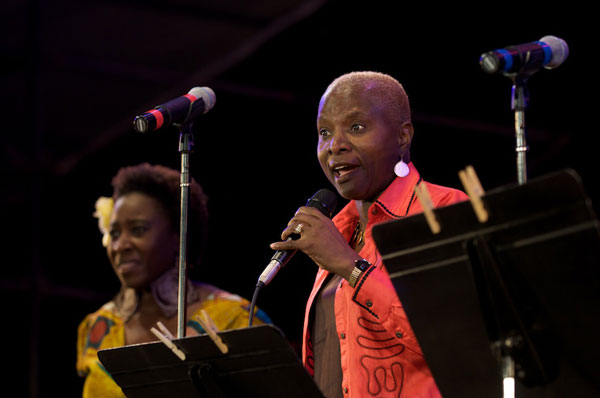
Angelique Kidjo at Red Hot and Fela, Lincoln Center (Eyre 2014)
BE: I’m curious about “Kamoushou.” That’s one that starts out with women singing.
AK: Let me tell you about “Kamoushou.” The choir that you have there has my mother in the picture with them. Because that is the village where part of my father’s family settled. My mom’s paternal family—there were seven brothers with one sister at the end. And the sister married into that village and settled there. So once my grandfather passed away, all the men were gone. When I was born, I didn’t know my grandpa on both sides—so, for me, my grandpa figure was that auntie. We called her “Mama Cooshay.” And she embodies such a male spirit. She’s so funny, so courageous. So, for me, every time I go to Gadome, it’s like visiting my grandpa and the family that has come from the marriage of that grand-aunt from that place. So I arrive and I have grand-grand-grand-children of my auntie there. And of course in Gadome, as much as in Ouidah, you always have one of my cousins that sticks out of everything—if it isn’t their hair, it’s their nails. Tradition! We can come and mingle with you, but don’t ask us too much because we want to be like that. They want to be different. So I have one of those cousins there with the pierce-ful voice. The powerful voice. When people ask me, “Where did you get that?” I say, “My family.” So, there we speak Yoruba. We sing in many different languages. That’s where I recorded “Kamoushou.”
BE: And that song is in Yoruba?
AK: Yeah. It’s an offering song, worshipping the ancestors. Because we believe that when somebody passes away from our family, it is only the body that is gone. The memory that we celebrate keeps them alive. And there is once a year a party where the spirit can embody somebody else, a living spirit, to speak to us. And before we have that ceremony, absolutely compulsory, we have to call the god of the wind to pave the way for no obstacle to be in the path. For that ceremony, the women will cook the food that is given to the spirit of the wind to eat, which is made with yam, with beans, and with a little bit of corn flour. You mix all of it together, you mash the yam, you cook it. They will not accept it if it is not presented well. If they do not accept it, you will have to start it all over again. That offering moment where we brought everything and they have to mix it together and see how it feels. The living god of wind is called Bakoko. He is the one that reports to the other spirits. Everybody is holding their breath because he is a little bit of a lunatic sometimes. Sometimes there is nothing. He just goes, “Get the hell out of here. I don’t want nothing.” It means he wants to come see you again. It’s not that he’s mad at you. It just means that he wants to come out again before the other gods come out. Because once he has accepted it and paved the way with no obstacle, no wrongdoing, and no harm to anybody, then he has to sit back and we have to have the party. So that was one of those moments where he said, “Yes.” And we brought the yams, we brought the beans. He sat there and looked at it with close attention. And then he goes, “Baka.” “Baka” means “it’s alright.” Everybody’s like, “Wow. Whew.” So that’s what I’m talking about in this song.
AK: Shango is the god of thunder, lightning and justice. And he’s one of those gods that represents both sexes. He also plays the role sometimes of counseling young kids, who are putting their lives at danger, who are making reckless decisions when their moms have told them to not do this: “I’m telling you this because you are putting your life in danger.” And they are right on the verge of killing themselves. And Shango comes and says, “
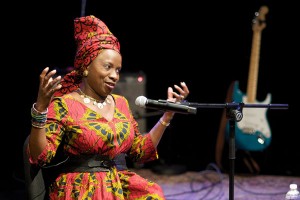
Angelique Kidjo at BAM (Eyre 2014)
you’re stupid enough to do this, I’ll push you in. Because you have been told not to do this. Your life is more important than you trying to test your mom’s sanity.” But you know, your mom is your mom. When you say something is forbidden to any child, they go, “Mmmm... mmmm… OK. I’m going to try that one day.” Those are the moments you see the importance of the gods in our region, and the myth of it. That’s the story of that song.
Then “Eva,” the third song—for me, first of all, Eva is the middle name of my mom. People in her family call her Eva. Some people call her Eve. So that’s why I call the album Eve. Because she was my mother, and also because Eve was the first woman that we blame everything on. Men have told the story of that woman over and over again the way that it pleased them. Men have been the victim of Eve without taking any part of it. This song is important to me because it’s about women’s friendship. What if we succeed creating that bond where there’s no woman in the world who will go every night with abuse without having anyone to talk to? That we can share the good and the bad news. How can we make that happen? We have the technology. Why aren’t we doing it? Why aren’t we creating that coalition of women where we look after each other, where our love for one another has no bounds?
That’s why I’m singing that song with an African new generation singer, Aṣa. I met Aṣa a few years ago when she did the opening act for my show in Malawi. And from that moment on, when I heard her with a guitar, I’m like, “This girl has something else.” She has respect also for herself and for the ones that have come before. She is not about: “I am just here to stomp on you.” She’s here to learn. Whatever you say, she’s going to listen. If it doesn’t work for her, she’s not using it, which is good. But if she wants to use it, she uses it her way. And she’s really noble. That’s the thing that I like about her. She’s crystal clear. If she doesn’t like it, you know it. Period.
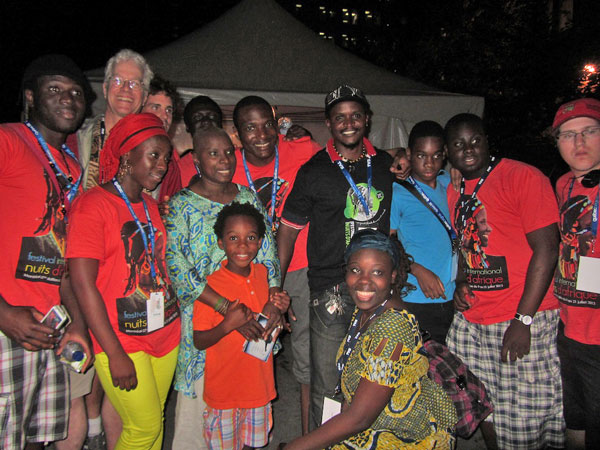
Angelique and fans backstage at Nuits d'Afrique
BE: I’ve seen her perform before. She’s very good.
AK: And then “Bomba.”
BE: “Bomba” with Rostam Batmaglij. You have a history with those Vampire Weekend guys, don’t you?
AK: I love them. The first time I met them was at the Witness event with Peter Gabriel. And I had never heard of them. And they said, “Wow. Angélique Kidjo! We love ‘Malaika.’ We are huge fans.” I’m like, “OK. Who are you?” They say, “Vampire Weekend.” I said, “OK. Let me hear your music.” And I loved it. I loved the way they played the rock ‘n roll and the African sound in the rock ‘n roll. Because I’ve been telling people, “Rock ‘n roll would not exist without African music.” And they just bring it. It’s unique. Because it comes from their souls. And that’s why inviting Rostam is such a normal thing because he plays in the African style. He comes from India, so you have that polyrhythm in his background, mixed with African music and rock ‘n roll is perfect.
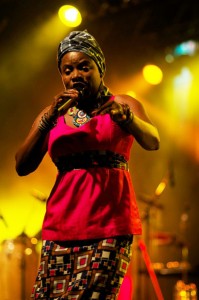
BE: I interviewed them when their first album came out. Ezra Koenig told me his father had listened to African music. That’s what’s interesting about their generation, because people my age—Americans—practically no one grew up listening to African music. Now you’ve got people who did, who are making great music, and Africa has been part of their mix all along. Gotta love that. So tell me about “Bomba.”
AK: Well, the song “Bomba” is about the elegance of African music. Bomba is the African camisole. You can find it in many different shapes or forms. Even if the fabric is the cheapest ever, it’s the way you wear it. Because in our society we judge people according to what they wear. It’s not the money you put into elegance, it’s how you wear it. It’s how you hold yourself. And that’s why I wrote that song and it’s talking about the pride that the women of Africa put into their bomba. They might not have anything, but at least, this one on their back—they made it themselves. And they own it.
BE: And then on the song “Hello,” you work with a group I don’t know, Trio Teriba. Tell me about them.
AK: Trio Teriba is a new girls’ band from Benin. And I heard about them two years ago when I was the head of the jury for RFI, the new Découvertes, and I didn’t know ‘til I got there that they were part of it. For me, it is conflict of interest, and if I had known, I would say, “I am not…” because they were good. What is interesting is that they sing, they play percussion, and play instruments together. It’s my way, also, of bringing to the world new talent from Africa, from Benin and from other places. You have to pass the baton. I’ve been able to have the career that I’ve had because I did lots of opening acts for people that were more known than me at that time. So that’s why I want their voices on there.
BE: Is that why the song’s called “Hello”?
AK: No. “Hello” is completely different. “Hello” is a Hausa song. The idea of the song was celebrating a consensual marriage between two grown-ups. Even if the husband is older, the woman has chosen her partner. The mood in that song—you can feel the joy, you can feel the celebration where really everyone is happy to see one another and they say, “Hello. Hello.” When it is a celebration or a marriage everybody comes together. Not only are they celebrating together, but they are celebrating a happy marriage. No matter what happened along the way, the bride is smiling, the groom is smiling. Everyone is happy. And in the song, toward the end, is the forced marriage. What you’re listening to is the marriage of a child, going, “What about my dreams? My parents—I know they love me. They’re telling me that it’s going to be better for my future to be married to an old man. I have the dreams, but nobody’s listening. They’re telling me, ‘You should be proud. You’re starting another lineage.’ I don’t care lineage. I care about my life.” So that’s the opposite of “Hello” and “Cauri.”
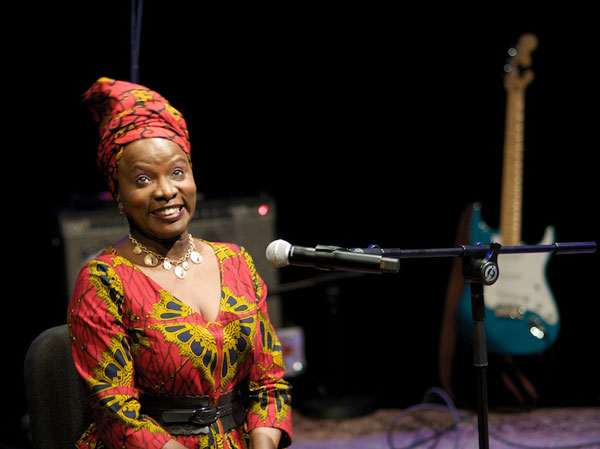
Angelique at BAM (Eyre 2014)
BE: Let’s talk about “Kulumbu” with Dr. John. That must have been fun.
AK: That was fun. We talk about women’s empowerment and women’s empowerment cannot happen without men being on board—men that don’t feel threatened by strong women or by women at all, that, like my father, believe that if their wife is happy that they are the happiest man on the planet. I’ve seen it firsthand. I’m not a feminist that says, “Get rid of the men.” We want the men. We need them. Together, we are a necessary evil to one another. For me, to talk about peace. “Colombe” in French is the dove of peace. How can we achieve peace without men being active in the peace process? When there is a place at war women are at the center of it. They are the ones that suffer first. They are the ones that try to keep some normality in the life, keep the families together. They are the ones sometimes behind the scene that talk sense to men to stop their nonsense. That song has a New Orleans vibe to it. And if there is one man I know who is a man of peace it is Dr. John and I wanted him to be on this album to help me carry this message and to empower the women of Africa to let them know that there are men in the world that are not abusers of women, that love women entirely, that are willing to help in many different ways. And that’s why one of the lines of the song is, “We all have to go back and learn how to fall in love with love.” Because we are living too fast and we tend to be fed with the idea that money is about it all. No, money can’t buy love. Long-lasting and true love—money can’t buy it.
BE: Have you known Dr. John for a while?
AK: Oh yeah. The way he plays the piano—I wish I could play just .0001% of it. That’s just not going to happen. It’s all from the toes all the way to the head.
BE: What’s interesting is the style of that song-- the rhythm is a little bit French Caribbean. And that so ties into the history of New Orleans. Did you think about that or did that just kind of happen naturally?
AK: I felt it and I don’t have to explain it. That’s just the way it is. I’m the one that always tells people and I believe it because I’m mixed from different parts of the world that there is only one humanity. Within that, we are all unique. We all have different ways of approaching problems and solving them. But above it all, we all descend from a man and a woman. It doesn’t matter the skin color that a person has. So, Caribbean, American, whatever it is, it’s all the same to me. It’s only the ocean that separates both.
BE: But at the same time, you made a record that really delves deeply into French Caribbean music.
AK: Absolutely. Because that was the moment to make that clear, to make people
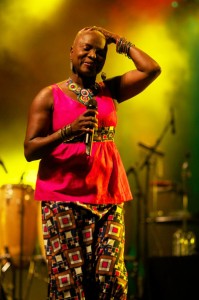
understand not only that slavery impacts this country, it impacts other parts of the world and it has given birth to beautiful music. And very distinctive music. It doesn’t matter how much you want people to believe that the ones that you enslave have no culture, have no civilization, have no history, you can dehumanize as much as you want, it comes back and bites you because you dehumanize yourself. That’s just what we’ve seen. You can’t just go around abusing people and think, “Oh, because I’m an abuser I’m stronger.” No. You are weaker. You are not the winner. You’re the loser.
BE: I think that was clever—that French Caribbean connection with New Orleans.
AK: Absolutely. It’s important. Not to divide but to bring together what we have beautifully in common.
BE: And just to understand how we got to be the way that we are.
AK: It gets there because some people have gathered together and decided how to divide and conquer and keep the power. And as long as you divide people you keep the power. When the power slips out of your hands, you don’t have a plan B, it comes back and blows up in your face.
BE: It’s getting harder to do that now. The way information is shared.
AK: That’s exactly my point. Because the rich countries have really implemented poverty in Africa. Now we have the cost. How do we deal with it. Poverty is a business. And it brings other problems. There is so much, if you think about it, as a citizen of the world, it makes you sick, because knowing and not doing anything to change it, you give power to other people to abuse other people.
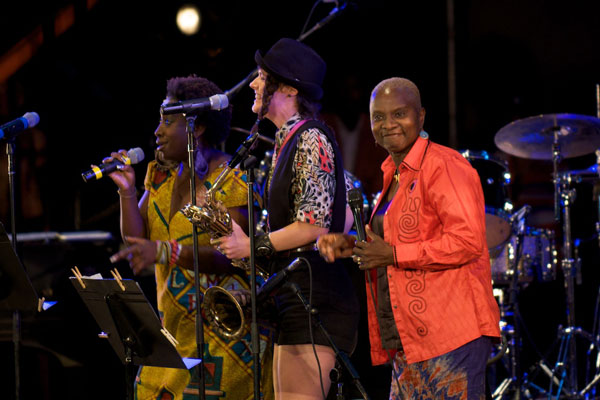
Angelique at Red Hot & Fela, Lincoln Center (Eyre 2013)
BE: I wanted to ask you about the two songs where you are using strings. You have one song with the Luzenbourg Philharmonic Orchestra and one with the Kronos Quartet, and they are very different. Maybe you could talk about them a little bit, maybe compare and contrast them a little bit.
AK: Well, “Awalole” had been arranged differently. When I sung that song, with the harmonies, and gave it to the director of the philharmonic orchestra in Luxembourg I used to work with, he came up with such a beautiful arrangement that I said, I have to keep it this way. Because it fits perfectly. In that song, when I said, “...the new leaders of tomorrow, are today.” And you can already find them in the attitude of asserting that power in many different ways. And those leaders, it doesn’t matter where they come from, they definitely want something different. So, bring it back to the perspective of Africa. I’ve met so many young kids that come up to me with so many great ideas, who know, and understand the geopolitical situation, and what is at stake, that I know for sure, it might not be in my lifetime, that another leadership is coming to Africa. That’s what I am talking about in “Awalole”. Now In “Ebile”, I stripped it down. I wanted it to be voice and percussion and strings, from the moment I did it. But I had to find who was going to do it. In the back of my mind I was thinking about the Kronos Quartet, but my worry was timing.
BE: They have done a lot of work with African musicians. They did that whole Pieces of Africa record in 1992.
AK: Yeah, they are really good at it. I did that “Ebile” song with the Gangbé Brass Band percussion players. It’s such a typical song, and it’s such a typical rhythm, from Benin. I mean, Benin is not known for harmony, as Mali is known, but rhythm in Benin is sick. And I mean we have so many different drums, it is ridiculous! I don’t know any other country in Africa that has so many drums. I mean, forget it! So, I wanted it to be stripped down like that, to have those two things meet. And when I met the Kronos Quartet, I said, I’m waiting for the day we are going to play this song in Benin, and they’re going to go “What in the world is that? Who are those guys? What is that?” And “Ebile” is about the common strength and belief in Africa, is how proud parents are when they see their kids become great adults, building their own lives, and it is an old saying, “Once we are no longer here, who will represent us? Our kids. And may we never be the one to bury
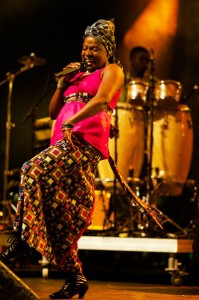
our children, but for them to bury us.” That’s what “Ebile” is about. That we wish for each one of us, in the world, it doesn’t matter what we achieve, through children, or the work that we leave, to leave a great legacy behind us.
BE: And that was the 1st time you met Kronos? You had never worked with them before?
AK: No. I knew their work, but I had never met them personally.
BE: Nice, I want to ask about one more song here, that is just an amazing achievement of power, “Orisha.”
AK: [Laughs] For me, “Orisha” is the musician’s song, because we had a lot of fun doing it. What I’m saying in the song, is that orishas, the pantheon of the Gods, when people think about religion that comes from Africa, they think negatively about it. And that song is just about celebrating and power. The song is something that I didn’t even think about. The rhythm and energy just swept me in, and I just followed it. Lyrically, what I’m saying is that people don’t have any knowledge about the religion of the orisha’s, about the Vodou religion. They only see what happened through Hollywood, and they don’t know anything about it. We worship elements and that is all it is about. And I’m saying, we don’t want no trouble with nobody. We do nobody no harm, we are just here to groove, to help you groove, and get on with your life-to deal with your life in hard time, and in good time. That’s all, that’s all “Orisha” is about.
BE: There are a lot of musicians on there, it’s a big jam.
AK: It’s a big jam, Steve Jordan, Lionel Loueke… I remember when we recorded, there was a 6/8 beat originally, but there was something not working about it. So I asked Steve to come back to do it. Christian McBride couldn’t do it, so we found another bass player to do it. It was really challenging for all of them. And then Steve goes, “Which market are you targeting with this polyrhythm of yours?” And I don’t target nobody. I just do the music, and that’s it. And he was just like: this is hard. And so, the bass player, Jerry Barnes, was like “I don’t know where to start this one, I don’t know where it’s going.” And I said, “Don’t count. Just jump in it, dive in it, hit it on the head.” And that’s what we did. And we had fun.
BE: That’s great. I gotta listen to it again with that in mind. That is really a great story. The song kicks ass.
AK: It was like, this is Angelique’s speed time.
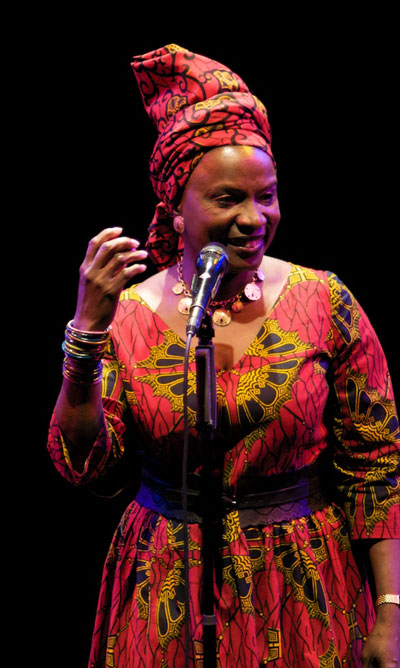
Angelique Kidjo at BAM
BE: Well, congratulations, it’s a hell of a record.
AK: Thank you so much. It was fun to do it. If I don’t have fun, I don’t go to the studio. I don’t like the studio. But I have managed throughout the years to have surrounded myself with great musicians. It’s about fun, and how we are able to do it together. How we put our skills and love together at the service of music. And that’s how I see my art. It has to be shared from the one.
BE: Can I ask you one thing about Lionel. I still have this great memory about the time I saw the two of you play at the Museum, and there’s just something amazing about it. I mean, I know the history, but there’s just some musical chemistry going on there between you two. I hope someday that you’ll do a kind of stripped down recording like that with him.
AK: Why not? One day, probably.
BE: Yeah, life is long.
AK: Life is inspiration for me. If I’m not inspired by something, I won’t commit to it, you see? And the truth of it is that you have to be there. When you are inspired to do something, you don’t just do it because you have to do it, or because it will be successful, or because it will be fun, or it is in. No you do it because you are inspired to do it and to touch people with it. It’s not only for you. You do music for yourself first, and once the music is out, you share it. It’s like you bring a child in this world. Once the child grows up and leaves the house, you have to give them the freedom to leave.
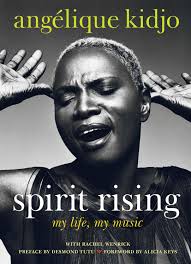
BE: Let me ask you about this book that is coming out, Spirit Rising. I imaging you must have been working with that writer for quite a while.
AK: Oh my god, if I knew that writing a book was longer than writing a song, I never would never have stepped a foot in it. But right now, I’m glad it’s over and, it has been a long delivery process, and, I’m glad I could do it in between the CD Oyo and the live album, Spirit Rising.
BE: So it all happened in the last three years?
AK: Yes, and because I know I won’t have too much of a load from tour to focus on it.
BE: You worked with a co-writer, Rachel Wenrick.
AK: Yes, she came here quite often. Well, the whole idea started a couple of years ago, when my father was still alive at that time, and I was talking about my upbringing, because people were asking me how did you get into music, and get to the point where you are? And I tell them it started at home. Because when you are a child, people have to understand that when you have a young kid, they have to be exposed to culture and art early, because they have that—the brain is like a sponge, and there is so much stuff in my brain, I don’t even know that they are there, and something will trigger it to come out. So being born in a family where music was at the center- music, theater, sports—was the center of the house. So I grew up in that, and somebody told me, “You should start, in front of a camera, talking about everything you can remember to get them out of your system.”
So I spent hours doing that, and I had those tapes already, and when I was approached by Harper Collins to write my journey—it’s not a memoir, because I am too young to write a memoir—it’s my journey through being born in a poor family in a poor country. From that place, all the way to Carnegie Hall, selling out Carnegie Hall. That was the turning point for me to be approached. And to tell my story. For me the whole purpose for me to accept doing it was to put in words for the new generation in the world, principally in Africa, for young girls and young boys to dream big and work hard. With their hearts, their soul. their guts, their brains. Anything is possible. The possibilities are endless. You will find hardship on the way. It’s not easy, I’ve been through lots of Hell, get through that, burned a little, brush it off, and continue.
I want them to have that determination. But, behind that determination, I never waived
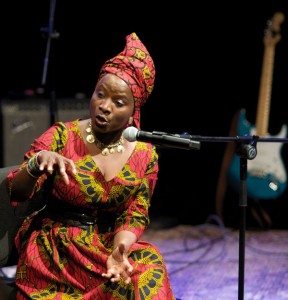
my identity. For me it was not a weight, it was a richness I embraced fully from the tip of my toes, all the way to my head. I grew up surrounded by old people, in the village, because my parents were not rich to send us on holidays anywhere, because there is more shade in the village, because summertime is Hell, and I arrive in the village, and I’m not happy to be there, but after two days I’m like, “This is another playground here, that I’m going to discover,” and that playground comes with a different vision of the world, a different approach. And as a child I was curious, and I would be asking questions, and from those questions and answers, I started to get to who I am, my own history and the place I have in my family and in my society
I had not thought about it before, but I knew deep down, whatever I do later in my life, I know where I am going to come back to, I know where I belong. It does not matter where I go. So, I want the young generation of Africans to understand that our cultures are beautiful. That we have nothing to envy to nobody. We can take good stuff from other cultures and bring it together and make ourselves better human beings. And give back our soul. That’s important, because once you have been blessed with the family I have been with, people willing to teach me, to work with me, to raise me up, I have to share it again.
For me, life is a cycle. What goes around comes around, and if you get and don’t give, you don’t get anymore. You dry the source. I have received so much support from many artists from around the world. From my family started when I was a young girl, having the support of my family, of my father. For me it is a blessing that I cannot keep for myself. My father always said to me, even before he passed away, he said, “Do not cancel any show to come and see me, because you were born to do this.” What he meant by this was: just give, as long as you can, give everything you can. And I have learned, since I was six, hearing my mom telling the actors and actresses of her theater group, “If you’re not ready to be naked out there on stage, don’t go on that stage.” You gotta be ready to be spiritually naked out there. To grab people’s soul and give them who you are. Be a mirror of all souls that come together; at that point, there are no differences of color or language anymore.
So that is what the book is about. To empower people, no matter where they come from, what language they speak, to understand that if we diminish ourselves, and see ourselves as colors only, as “Oh, I’m not born in this country, therefore I cannot do this.” We will not improve our universe. We won’t be anything in the human family we have together.
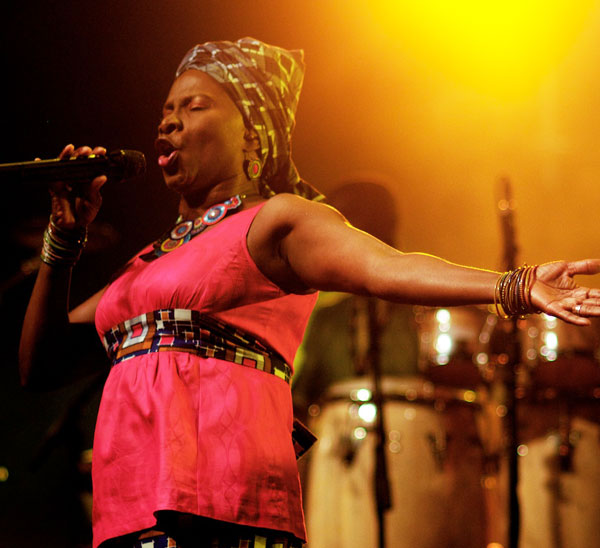
BE: Wow, that’s great. I love what your mother said about going on stage. That reminds me, I didn’t ask you, tell me about the song you did with your mother, “Bana.”
AK: That is a song that my mom used to sing to me as a child, that came from her childhood. My mom was born in Point-Noire, because her father was working there. Her father passed away when she was a little girl. She was not even born, I think, when her father passed away. She used to play in the street. She speaks Swahili, Kikongo, Lingala. My mom speaks all of those languages, not me. So she taught me the song. I don’t speak the language, so what I remember, I put in the song, I don’t even know. For me, basically what she was trying to teach us, was to value people over money. If you don’t have money, you still have your life. Money can’t buy you life, money can’t buy you health. Money can’t finish—“mbongo” is money in Lingala, “bana is finished," money is finished? If you don’t have something concrete, something more solid that you build your life on, then you go around wandering around doing nothing with your life. Money is a necessary evil, but yet, be somebody. Do something.
BE: What language is that song in?
AK: Lingala.
BE: And did you record her there in Benin?
AK: Yeah, I recorded her in Benin. Actually, she was sick when we recorded, so she was coughing a lot. I asked my brother who has a recording studio there, once she gets better, to just sync up the vocals, and send her my voice. And that’s how we did it.
BE: That’s great. Ok, just to end, let’s talk a bit about 2014. You mentioned a new project with Philip Glass in Luxembourg, the book is coming out, you’ve got that new record; It’s going to be a good year.
AK: I hope so, I really hope so. A big good year, I hope. I just have to pile up some hours of sleep and get ready for it. We already have a couple of days for a book tour lined up. We’re going to be in Los Angeles at the Public Library the 23rd or 27th of January, San Francisco, the Barnes and Noble in Union Square here, BAM...
BE: And then this Luxembourg thing with Philip Glass.
AK: And I’ll be in Luxembourg with Philip Glass, who is writing a piece for me, which I am working on, which is very difficult, but beautifully written.
BE: You are rehearsing this now?
AK: Yeah, I recorded it. I recited a poem that he will write the song on. Yoruba is a tonal
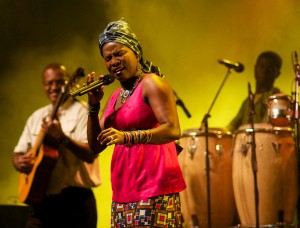
language, like most of the languages in Africa. You have to put the tone where it is, otherwise you mean something else. Sometime you can change it, sometime you can’t because it is already written like that, so I tried to put the tone right for him to see how he can adapt it, and that’s where we are right now.
BE: How’s he doing with that?
AK: Great. For me it’s a challenge because it’s not like when I write my songs—a song for me is four minutes, at most. And this is a 20 minute piece. So for me that’s where the challenge lies.
BE: Fantastic, I hope I get to hear it.
AK: I hope you do! You will, certainly.
BE: I expect I will. Thank you so much for all this.
AK: You’re welcome!








